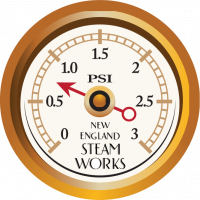Pimping the Barnes & Jones Big Mouth air vent
What I will attest to is the build quality and execution of the design. These vents are awesome.....AWESOME!
Now not that a steam vent is anything to necessarily geek out over, but wow!!!! pick up one of these and look it over and you feel like you are actually holding something! The fit and finish are second to none, the unit is easily opened up if ever needed any type of servicing (Not that it should its simple as pie) the machining inside and the o-ring seals are gorgeously executed. The solid brass castings for the bodies are heavy and TIGHT, not some crater filled rough casting, I was truly impressed. So much so.....and feel free to call me a dork.....that I took the liberty of spending some time with a buffing wheel putting a high polish on them.
In my building the main vents dont live in the basement, they are mounted at the end of my mains which run along the ceiling in the ground floor which is usable living space. So they can be seen if you know where to look. So I figured why not do these justice and make then look even more impressive. So now when the system fires and shortly after you hear my system start exhaling with a soft whooooooosh coming from above you head and you look up, youll see four of these bad boys gleaming back at you.
I was really impressed upon seeing them, Peter Owens was kind enough to help with answering some questions I had, and these were a breeze to install and for something as mundane as an air vent, they just look bad ****......
oh and yeah.....my building heats up a bit faster now. So most importantly yes....THEY WORK. If you need a vent or vents, definitely take a look at these!











Comments
-
6
-
Oh thank goodness!!! we must unite my brother!!! hahaha. Did you find that with as much time as it takes to get them nicely polished, its worth the time and effort and you find yourself peeking at them more? its like the vents smile back at you and say "Hi!"
Im thinking some nice mood lighting aiming may be a nice touch too ;-)Weil McLain EGH 95 400,000 BTU single pipe steam0 -
-
My wife gave me permission to do just that, but I am thinking perhaps the Gorton vent they replaced might be a better (lighter) choice.BobC said:If they weren't so heavy I'd hang them on the Christmas tree as ornaments.
Bob0 -
Ok, I see where this is going so......
If you really wanted to be hardcore and use the big mouth vents as Christmas tree ornaments, but are having issues with their weight causing the limbs to sag, you could just build a big tree from black iron pipe fittings and nipples and have antler branches with the vents on them. See how the wife and kids like that in the living room hahahaha!Weil McLain EGH 95 400,000 BTU single pipe steam2 -
I LOVE IT!gwgillplumbingandheating.com
Serving Cleveland's eastern suburbs from Cleveland Heights down to Cuyahoga Falls.0 -
-
-
Now now boys....admit it...."gonna havta face it were addicted to STEAM..." They reeeeel purdy, though.... Mad Dog0
-
My wife actually suggested I make a small tree out of spare fittings to decorate the boiler. I love my wife!0
-
erhm... this coming from the guy that is obsessed with running his steam boiler at sub-atmospheric pressures?ChrisJ said:Ok,
All of you have problems, you know that right?
 2
2 -
That's why it's funny.Abracadabra said:
erhm... this coming from the guy that is obsessed with running his steam boiler at sub-atmospheric pressures?ChrisJ said:Ok,
All of you have problems, you know that right?


Single pipe 392sqft system with an EG-40 rated for 325sqft and it's silent and balanced at all times.
0 -
Looks awesome! I'll have to do mine at some point too!0
-
Yes. They are looking really good..
Has anyone done some testing for what approx. temperature the Big Mouths are opening between steam cycles? IF memory serves well, and it usually doesn't, the Gorton #2 opens at about 130F and the Hoffman 75 opens around 180F.
Any data yet on the BMV's..?0 -
Ours will operate with a 12-15 degree subcooling effect. If we assume the steam temp is 213 for most low pressure systems you're looking right at 200.
I remember trying a test of this using a compressed air piece of pipe and a gauge but didn't have any luck getting repeatable results mostly due to setup and I was influencing the temperature with the air.
We know from making traps for 100 years that our diaphragms are calibrated to that design subcooling temp and the Big Mouth is essentially a radiator trap with an o ring seal.
If anyone has any good ideas about how to test for that opening temp I'm all ears. I suppose I could just close with steam, shut it off and them poke at the plug until I detect movement all while monitoring temps but that doesn't seem very scientific. Also the plug only needs to lift a fraction for it to openPeter Owens
SteamIQ0 -
A drop in pressure, instead of poking.0
-
The open pipe venting capacity and air vent charts attached on this wall are very helpful. But i dont see anything with information on the venting capacity of an open 1 1/4 inch or larger open tap. This is for a 1920's NYC 90 unit apt building with large diameter and very long overhead steam mains with 1 1/4 tap from Tee at end of each run.
thanks0 -
I ask on this discussion because i dont know how many Barnes and Jones big mouths to use at each location to maximize venting.0
-
You should measure the length of the piping in various diameters, which feed all the radiators, and post it here. This is the volume of air which must be allowed to escape without any resistance so the steam may rise into all the radiators. I have the equivalent of 12 Big Mouth vents for 55 radiators on a 1,050,000 BTU boiler, so you may need a few more. The air should vent at a couple of ounces pressure as shown on a low pressure gauge, (Valworx 0-3 psi.).
How many stories are in the building? What is your location?--NBC0 -
@nicholas bonham-carter , I'm assuming you left a 0 off of your boiler BTU number. 55 rads a 105K boiler probably won't work.nicholas bonham-carter said:You should measure the length of the piping in various diameters, which feed all the radiators, and post it here. This is the volume of air which must be allowed to escape without any resistance so the steam may rise into all the radiators. I have the equivalent of 12 Big Mouth vents for 55 radiators on a 105000 BTU boiler, so you may need a few more. The air should vent at a couple of ounces pressure as shown on a low pressure gauge, (Valworx 0-3 psi.).
How many stories are in the building? What is your location?--NBC0 -
Thanks Fred! Quite right it's one million, fifty thousand.
Now i don't see my Edit button-has it moved?
Once again, I will say that the price tag of main vents is an investment, and not an expense. The yield in reduced fuel consumption can be as high as 30%!--NBC0 -
My edit button is in the same location (little cog in the upper right corner, directly across from your name at the top of your post).nicholas bonham-carter said:Thanks Fred! Quite right it's one million, fifty thousand.
Now i don't see my Edit button-has it moved?
Once again, I will say that the price tag of main vents is an investment, and not an expense. The yield in reduced fuel consumption can be as high as 30%!--NBC0 -
But if i can put 3 big mouths (10.8 cfm total potential) on a 3/4 tap and have more venting that the tap can actually produce and i can have a 1 inch tap with 3 big mouths which cannot keep up with the potential venting of a wide open 1 inch tap (but not worth installing a 4th), then how much venting can i get from a wide open 1 1/4 inch tap? i just need the next size up from 1 inch tap venting capacity so i know how many big mouths to install on the 1 1/4 inch taps. BTW; i have a 75,000 sq ft apt building with 250+ huge free standing radiators.0
-
There are any number of guys here that can tell you the formula to calculate the air flow capacity of a pipe. The formula is on here somewhere but I can't find it. @Jamie Hall can tell you.0
-
Would anyone else know this information? I havent received a response. How many bigmouth vents for a 1 1/4 inch tap location? how many CFM can pass in a 1 1/4.
thanks0 -
I don't think anyone has tested it, but I'd say there's a good chance 1 1/4" handles 2.5 to 3 times what a 3/4" tap will. I can't remember the CFM rating of a 3/4" tap but I know it's out there.scott22nyc said:Would anyone else know this information? I havent received a response. How many bigmouth vents for a 1 1/4 inch tap location? how many CFM can pass in a 1 1/4.
thanks
Single pipe 392sqft system with an EG-40 rated for 325sqft and it's silent and balanced at all times.
0 -
I believe a 1 1/4" pipe will vent at about 14 CFM at 3 ounces of pressure so it would take about 4 Bigmouths (3.6CFM ea @ 3 Ounces of pressure). The real issue, however is how long and what diameter main are you trying to vent? It's the amount of air in the main that needs to be vented. If it's a small main, adding all that venting isn't buying you anything. A big main may be a different story.
0 -
-
-
It's amazing how much volume goes up as pipes get bigger isn't it?Koan said:A 3/4 pipe will vent 9.5 CFM @ 3 oz (citing Gerry Gill). The internal area is 0.53 sq in. A 1&1/4 pipe has an area of 1.50 sq in. I would assume a 1&1/4 open pipe would vent 9.5 CFM x 1.50/0.53 = 26.9 CFM at 3 oz.
Single pipe 392sqft system with an EG-40 rated for 325sqft and it's silent and balanced at all times.
0 -
-
@Koan , according to Gerry Gill, a 1" pipe will vent 11CFM at 3 oz of pressure. I don't thint another 1/4" will add an additional 16 CFM ??? I still think 4 Bigmouths, maybe 5 would be the limit.Koan said:A 3/4 pipe will vent 9.5 CFM @ 3 oz (citing Gerry Gill). The internal area is 0.53 sq in. A 1&1/4 pipe has an area of 1.50 sq in. I would assume a 1&1/4 open pipe would vent 9.5 CFM x 1.50/0.53 = 26.9 CFM at 3 oz.
0 -
Fred said:
@Koan , according to Gerry Gill, a 1" pipe will vent 11CFM at 3 oz of pressure. I don't thint another 1/4" will add an additional 16 CFM ??? I still think 4 Bigmouths, maybe 5 would be the limit.Koan said:A 3/4 pipe will vent 9.5 CFM @ 3 oz (citing Gerry Gill). The internal area is 0.53 sq in. A 1&1/4 pipe has an area of 1.50 sq in. I would assume a 1&1/4 open pipe would vent 9.5 CFM x 1.50/0.53 = 26.9 CFM at 3 oz.
a 1.25" pipe will vent 56% more than a 1".
What's odd is this suggests a 1" pipe can pass 78% more than a 3/4" pipe, but Gerry Gill's chart shows little increase between the two, 9.5 vs 11? A 1" should pass 17 CFM according to the math.
Maybe real world just doesn't work that way?Single pipe 392sqft system with an EG-40 rated for 325sqft and it's silent and balanced at all times.
0 -
I agree that my math and the real world must differ. One would think, as I did, that increasing with area as the square of the radius would apply, but Mr. Gill's reasearch shows different results. I was increasing solely on the area. I defer to Gerry Gill's empirical evidence. I assume the friction of the air flow against the larger surface area may be a factor. Using a linear extrapolation, adding a quarter inch in diameter adds 1.5 CFM. This would indicate a 1&1/4 open pipe would vent at a minimum 12.5 CFM @ 3oz. This would indicate at least 4 big mouth vents. That would cover up to 3.6 x4 or 14.4 CFM. I would say this is our starting point. Ironically this is what @Fred originally suggested. The math using area says 8 vents, the reasearch extrapolates linearly to 4 vents. It is actually 7.5 and 3.5. The average is 5.5. I would start at 5 or 6 vents. 5 vents would be 18CFM and cover the increase from 1" at 11 CFM. My best guess is 5, I would use 6.0
Categories
- All Categories
- 87.5K THE MAIN WALL
- 3.3K A-C, Heat Pumps & Refrigeration
- 61 Biomass
- 430 Carbon Monoxide Awareness
- 122 Chimneys & Flues
- 2.1K Domestic Hot Water
- 5.9K Gas Heating
- 117 Geothermal
- 170 Indoor-Air Quality
- 3.8K Oil Heating
- 78 Pipe Deterioration
- 1K Plumbing
- 6.6K Radiant Heating
- 395 Solar
- 15.9K Strictly Steam
- 3.5K Thermostats and Controls
- 57 Water Quality
- 51 Industry Classes
- 51 Job Opportunities
- 18 Recall Announcements

















